Latest Research Publications
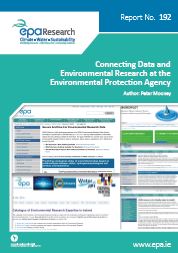
Research 192: Connecting Data and Environmental Research at the Environmental Protection Agency
Author: Peter Mooney, October 2016
Year: 2016
Research 192 Connecting Data and Environmental Research at the Environmental Protection Agency
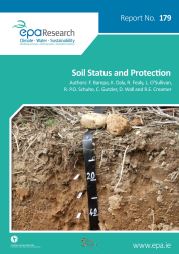
Research 179: Soil Status and Protection
Authors: F. Bampa, K. Daly, R. Fealy, L. O’Sullivan, R. P.O. Schulte, C. Gutzler, D. Wall and R.E. Creamer, October 2016
Year: 2016
The objectives of this desk study were to review the current EU and Irish legislations, policies and available data which assess or encompass soil protection issues for Ireland.
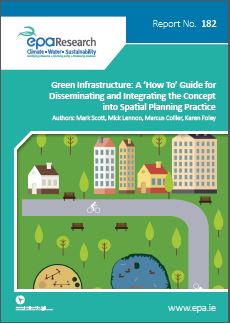
Research 182: Green Infrastructure: A ‘How To’ Guide for Disseminating and Integrating the Concept into Spatial Planning Practice
Authors: Mark Scott, Mick Lennon, Marcus Collier, Karen Foley, September 2016
Year: 2016
A ‘How To’ Guide for Disseminating and Integrating the Concept into Spatial Planning
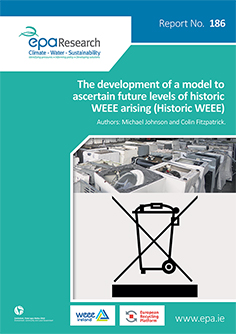
Research Report 186: The Development of a Model to Ascertain Future Levels of Historic WEEE Arising (Historic WEEE)
Authors: Michael Johnson and Colin Fitzpatrick, August 2016
Year: 2016
Using a range of data sources including census data, historical WEEE audits and comprehensive sampling this project employed material flow analysis and statistical methods (Weibull Probability Density Function) to estimate future return rates of historical WEEE.
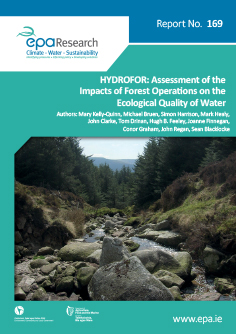
Research 169: HYDROFOR: Assessment of the Impacts of Forest Operations on the Ecological Quality of Water
Authors: Mary Kelly-Quinn, Michael Bruen, Simon Harrison, Mark Healy, John Clarke, Tom Drinan, Hugh B. Feeley, Joanne Finnegan, Conor Graham, John Regan, Sean Blacklocke, July 2016
Year: 2016
HYDROFOR is an EPA and DAFM-supported multi-sector co-operative project to investigate the impacts of forestry operations on Ireland's aquatic ecology.
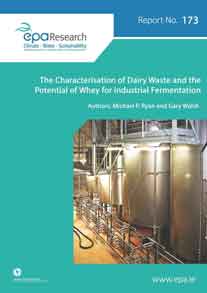
Research Report 173 - The Characterisation of Dairy Waste and the Potential of Whey for Industrial Fermentation
Authors: Michael P. Ryan and Gary Walsh, July 2016
Year: 2016
Research Report 173 detailing The Characterisation of Dairy Waste and the Potential of Whey for Industrial Fermentation
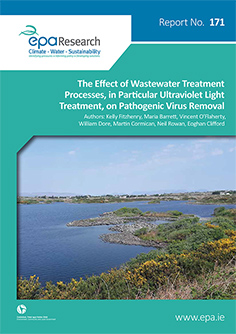
Research 171: The Effect of Wastewater Treatment Processes, in Particular Ultraviolet Light Treatment, on Pathogenic Virus Removal
Authors: Kelly Fitzhenry, Maria Barrett, Vincent O’Flaherty, William Dore, Martin Cormican, Neil Rowan, Eoghan Clifford, July 2016
Year: 2016
This study investigated the use of an alternative virus (FRNA bacteriophage) as a potential surrogate/model for norovirus behaviour.
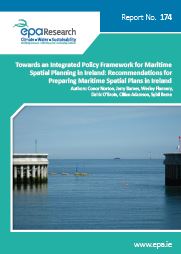
Research 174 - Towards an Integrated Policy Framework for Maritime Spatial Planning in Ireland: Recommendations for Preparing Maritime Spatial Plans in Ireland
Authors: Conor Norton, Jerry Barnes, Deiric O’Broin, Wesley Flannery, Cillian Adamson and Sybil Berne, June 2016
Year: 2016
There is a need for a holistic vision and management to allow for the balance of social, economic and environmental interests and to ensure that maritime space and resources are used in a planned and sustainable manner.
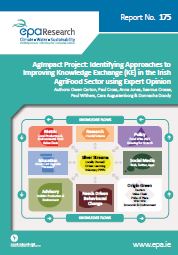
Research 175 - AgImpact Project: Identifying Approaches to Improving Knowledge Exchange (KE) in the Irish AgriFood Sector using Expert Opinion
Authors: Owen Carton, Paul Cross, Anna Jones, Seamus Crosse, Paul Withers, Cara Augustenborg & Donnacha Doody, June 2016
Year: 2016
There is significant pressure to develop knowledge exchange (KE) processes that will facilitate the application of existing and new knowledge in order to deliver increased agricultural production efficiency and profitability while protecting natural capital including water.
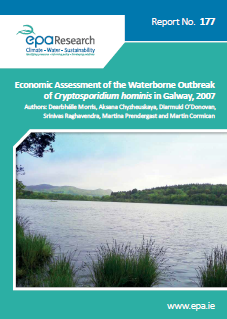
Research 177 - Economic Assessment of the Waterborne Outbreak of Cryptosporidium hominis in Galway, 2007
Authors: Dearbháile Morris, Aksana Chyzheuskaya, Diarmuid O’Donovan, Srinivas Raghavendra, Martina Prendergast and Martin Cormican, June 2016
Year: 2016
Water is a limited and precious resource and is being consumed worldwide at unsustainable levels. It is therefore essential to place an economic value on this precious resource. In March 2007, the largest outbreak of cryptosporidiosis since surveillance began in Ireland occurred, and was associated with contamination of the water supply serving Galway City and surrounding areas.
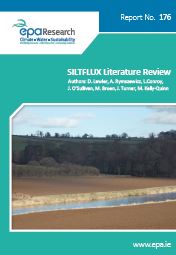
Research 176: SILTFLUX Literature Review
Authors:Damian Lawler, Anna Rymszewicz, Liz Conroy, John O’Sullivan, Michael Bruen, Jonathan Turner and Mary Kelly-Quinn, June 2016
Year: 2016
This review summarises the key issues that affect the role of fine sediment in fluvial systems, with a focus on northern Europe, the UK and Ireland, which will be of most relevance to the SILTFLUX project.
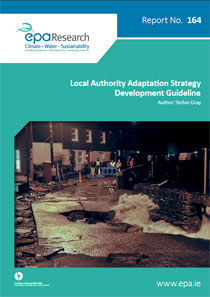
Research Report 164 - Local Authority Adaptation Strategy Development Guideline
Author: Stefan Gray, May 2016
Year: 2016
The purpose of this guideline is to support local authorities in the development of a local climate change adaptation strategy. In its structure and content, the guideline draws heavily on the 2013 Guidelines on Developing Adaptation Strategies provided to European Union Member States by the European Commission (SWD(2013) 134 final), with the aim of fostering coherence between strategies developed at local and national scale.
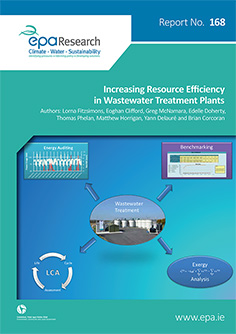
Research Report 168: Increasing Resource Efficiency in Wastewater Treatment Plants
Authors: Lorna Fitzsimons, Eoghan Clifford, Greg McNamara, Edelle Doherty, Thomas Phelan, Matthew Horrigan, Yann Delauré and Brian Corcoran, May 2016
Year: 2016
The focus of this project was the resource efficiency of Irish wastewater treatment plants (WWTPs). The perspective of the report is both operational (economic) and environmental. Wastewater treatment is a resource-intensive process, with three main resources being identified as those of greatest concern: energy, chemicals and water.
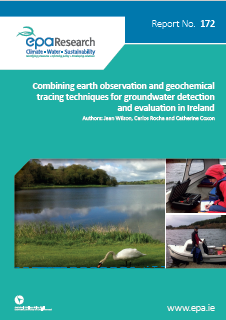
Research 172 - Combining earth observation and geochemical tracing techniques for groundwater detection and evaluation in Ireland
Author: Jean Wilson, Carlos Rocha and Catherine Coxon, April 2016
Year: 2016
Precipitation that reaches the earth’s surface can infiltrate into the ground to become groundwater. Groundwater is subsurface water that fully saturates pores or cracks in soil and rocks. While an important source of freshwater globally, groundwater is also environmentally important as baseflow or low-water flow, which maintains river, stream and lake levels, as well as their associated ecosystems.
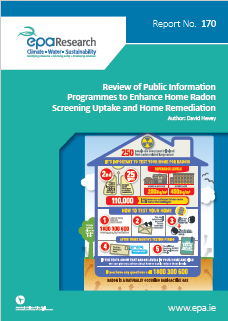
Research 170 - Review of Public Information Programmes to Enhance Home Radon Screening Uptake and Home Remediation
Author: David Hevey, April 2016
Year: 2016
Radon is a naturally occurring radioactive gas. It has no taste, colour or smell. It is formed in the ground by the radioactive decay of uranium which is present in all rocks and soils. The World Health Organisation has categorised radon as a carcinogen, in the same group as asbestos and tobacco smoke.
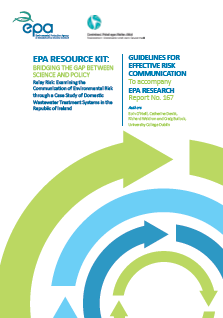
Research 167 - Guidelines for Effective Risk Communication
To Accompany EPA Research Report 167, March 2016
Year: 2016
The accompanying guidelines to Research 167 which examines the elements required for the preparation, implementation and monitoring of engagement strategy.
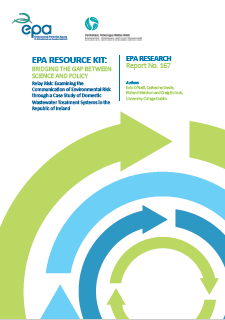
Research 167 - EPA RESOURCE KIT: Bridging the Gap Between Science and Policy
Relay Risk: Examining the Communication of Environmental Risk through a Case Study of Domestic Wastewater Treatment Systems in the Republic of Ireland, March 2016
Year: 2016
The report examines the elements required for the preparation, implementation, and monitoring of an engagement strategy aimed at communicating risk-based environmental regulation of domestic wastewater treatment systems to owners of such systems. The report is aimed at regulators, national and local authorities, and policy makers, particularly those involved in environmental risk communication, management and assessment
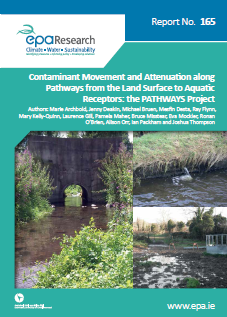
Research 165 - Contaminant Movement and Attenuation along Pathways from the Land Surface to Aquatic Receptors: the PATHWAYS Project
Authors: Marie Archbold, Jenny Deakin, Michael Bruen, Mesfin Desta, Ray Flynn, Mary Kelly- Quinn, Laurence Gill, Pamela Maher, Bruce Misstear, Eva Mockler, Ronan O’Brien, Alison Orr, Ian Packham and Joshua Thompson, March 2016
Year: 2016
The synthesis report for the PATHWAYS project.